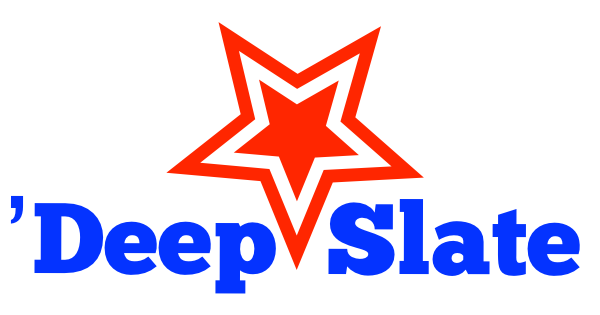
Wow. This feels like the election of my lifetime… and maybe of my 5 year old’s lifetime too. And that would be true even if 2020 had been a *normal* year.
Be strong. Be safe. Be kind. Let’s get this done. GO VOTE!
‘deep
.ps: Continue the tradition: #votingstickerselfie AFTER YOU VOTE: Take a pic with your voting sticker on your nose and hashtag it as #votingstickerselfie!
.pps: If you…
- Like what you read, please do let me know! Questions, criticisms, comments welcome!
- Want to know where to vote, am I registered?, has my ballot been counted? etc, jump to the Extras below.
- Want to get an email when I post the next ‘Deep Slate, just email me!
.ppps: Oakland? or San Jose? check out the Extras section.
WHAT IS THIS?:
Every San Francisco election cycle, I put out my “‘Deep Slate” voter guide. This post is my guide for this election!
The format of this post is:
- The LIST: the simple list of my endorsements for this election.
- The DETAILS: the whys and wherefores of each endorsement. This is how I arrived at each position.
- My VALUES: a brief explanation of my values and sources, to help make sense of my opinions.
- Sources: a collection of my sources and a tiny bit about how I arrive at my endorsements.
- Extras: If you want to know where to vote, or want to find older ‘Deep Slates, or some Oakland/San Jose stuff…
Also note that a few days after the election, you can come back and check the RESULTS by clicking here.
THANKS:
Thanks, as always, to the number of folks who have asked me for my opinions. I say it every time but it is quite true: I really am honored by your interest.
And big props to my lovely wife, for proofreading this and also for being so supportive of all my meetings and involvements!
So without further preamble, let’s dive in! (damn, that was a lot of preamble)
THE LIST:
Note: If you just want this list as a handy, printable text version, just click here.
Also note: the more CAPITALS, the more strongly I feel about it – especially on ballot measures.
FEDERAL:
President: Joe Biden and Kamala Harris
US Congress (D12): Nancy Pelosi
US Congress (D14): Jackie Speier
STATE:
State Senator: Scott Weiner
State Assembly (D17): David Chiu
State Assembly (D19): Phil Ting
Prop 14: Stem Cell Research Bonds: No
Prop 15: Property Tax for Schools: YES
Prop 16: Allows Affirmative Action: YES
Prop 17: Right to Vote After Prison: YES
Prop 18: 17 Year Olds Vote In Primaries: Yes
Prop 19: Prop Tax Rules: No
Prop 20: Parole Restrictions: NO
Prop 21: Local Jurisdiction for Rent Control: Yes
Prop 22: Benefits Exemption for Uber/Lyft etc: NO
Prop 23: State Requirements for Kidney Dialysis Clinics: No
Prop 24: Consumer Privacy Protections: No
Prop 25: Bail Reforms: Yes
SAN FRANCISCO:
Board of Supervisors (D1): Connie Chan
Board of Supervisors (D3): Aaron Peskin
Board of Supervisors (D5): Vallie Brown
Board of Supervisors (D7): #1 Myrna Melgar #2 Vilaska Nguyen
Board of Supervisors (D9): Hillary Ronen
Board of Supervisors (D11): John Avalos
Board of Education: Matt Alexander, Kevine Boggess, Jenny Lam, Michelle Parker
Community College Board: Aliya Chisti, Victor Olivieri, Tom Temprano, Alan Wong
Board of Directors (District 7): Lateefah Simon
Board of Directors (District 9): Bevan Dufty
Prop A: Health and Recovery Bond: YES
Prop B: Department of Sanitation and Streets: No
Prop C: Non-Citizen Voting for Boards and Commissions: YES
Prop D: Sheriff’s Dept Oversight: YES
Prop E: Abolish Minimum Police Staffing Requirement: YES
Prop F: Business Tax Overhaul: YES
Prop G: Youth Voting for Local Elections: YES
Prop H: Planning Code Reforms for Neighborhood Commercial: Yes
Prop I: Increase Transfer Tax: Yes
Prop J: Parcel Tax Update: Yes
Prop K: Authorize Affordable Housing: YES
Prop L: Disproportionate CEO Pay Tax: Yes
Prop RR: Rescue Caltrain: YES
Again, if you want these as a handy, printable list, just click here.
THE DETAILS:
Note: the more CAPITALS the stronger I feel about it – especially on ballot measures.
FEDERAL:

President: Joe Biden and Kamala Harris
I was for Warren. But as I said to many people, it really came down to “Who can beat the Evil Cheeto?” From the beginning of this race, the only candidate who constantly polled well against Evil Cheeto was Biden. And the women candidates did even worse against Evil Cheeto in head to head polling. 🤬 So even though his politics don’t reflect mine, I could never close the door on voting for Biden – he just made the most sense to win the swing states.
Since the Democratic nomination the national polls seem to reflect the same solidity against Evil Cheeto: Biden has always held a steady advantage. But the national polls really only reflect the popular vote, and as we know the popular vote means nothing. 😱 Even with his solid and steady lead in the national polls, the Electoral College vote is *much* closer. And scarier.
Luckily, the same qualities that make Biden less interesting to me make him more appealing to the swing state voters. And more impervious to the Evil Cheeto’s attacks (“He’s a radical!”). So yeah, I’m glad Biden is the nominee because otherwise I wouldn’t be able to sleep at night right now.
Going farther, once Biden announced his “really pretty good” climate plan, I was in. And when he added Kamala to the ticket, it was icing on the cake.
Now we just gotta make this happen. 🤞🠽 (Here is what I’m doing – jump in!)
US Congress (D12): Nancy Pelosi
This image pretty much sums it up (or go read what I wrote in March).
US Congress (D14): Jackie Speier
Here is what I said about Representative Speier back in March:
I wish I could get to vote for Jackie Spier sometime because she’s been a strong voice for the environment (she’s for the Green New Deal), women, and immigrants.
STATE:

State Senator: Scott Weiner
I’m a bit amazed at this race between Jackie Fielder and Scott Weiner. While I appreciate a lot of her opinions and where she is coming from, Scott has been a tremendously effective, thoughtful, and leading legislator in Sacramento. I’m glad we have him. This feels like one of those moments in San Francisco where we get so caught up in labels (Jackie = Progressive vs. Scott = Moderate) that we can blithely overlook leadership, experience, strategic sense, and achievement…all of which are Scott by a mile. If I hadn’t given *all* my money to the Biden campaign and the Democratic Senate campaign, I’d send as much as I could to Scott. Hopefully this turns out the right way.
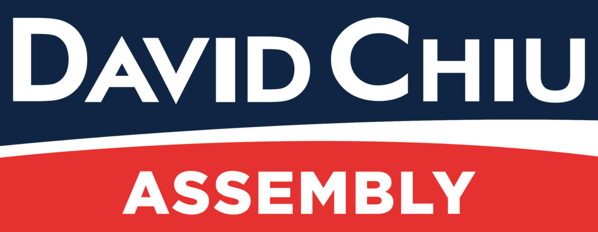
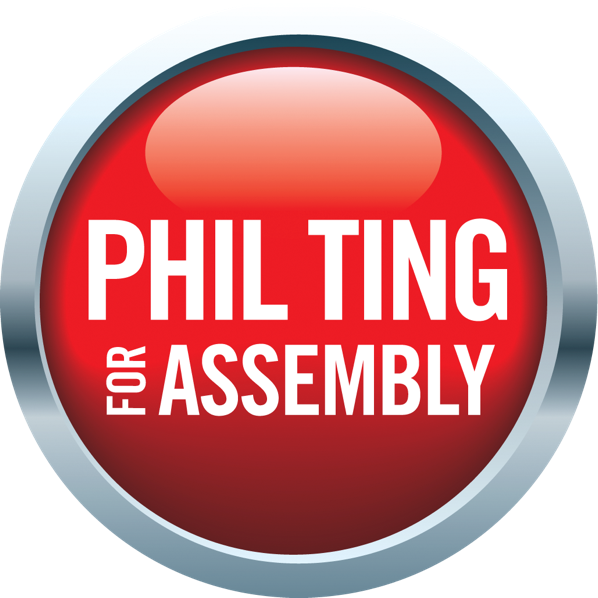
State Assembly (D17): David Chiu
State Assembly (D19): Phil Ting
Both Phil and David are running practically unopposed and have done really good work in Sacramento, especially on transportation and environmental issues. I recommend them both.
Prop 14: Stem Cell Research Bonds: No
An idea who’s time has come… and gone.
In 2004, I endorsed CA’s Proposition 71, which created a state-funded stem cell research program to the tune of $3 billion in bond revenue.
At the time, the Bush administration blocked federally funded embryonic stem cell research on religious grounds. (Oh my god, the Evil Cheeto is kinda making me nostalgic for George W.) It was necessary and helpful (and scored me a girlfriend I met on the campaign trail.)
Since the passage of Prop 71, California has become a leader in stem cell research and several promising therapies have grown from that work. Our state has gained more bio-tech talent, and several important universities and research institutions have gained important resources. Now, Prop 71’s funding is running out and the funding supervisorial agency it spawned (California Institute for Regenerative Medicine), is phasing itself out.
This measure seeks to sell a new round of general obligation bonds ($5.5 billion) to continue the work…. and since I love basic science funding, it’s tempting to say yes.
But here’s the thing: stem cell research is now well established. In 2009, President Obama authorized stem cell research, reversing W.’s shenanigans, and now the National Institutes of Health fund stem cell research just fine. Stem cell research doesn’t really need our help any more. And when you start to stack up all the things that do need our state’s funding and all the strain COVID-related devastation will place on our state’s finances, you realize we don’t *need* to do this. This is not how our tax dollars should be spent.
No on Prop 14.
.ps Interestingly, I just came across this argument against Prop 14, written by Jeff Sheehy, a Board member of California Institute for Regenerative Medicine itself, the very agency Prop 71 spawned. Jeff is also a former SF Supervisor.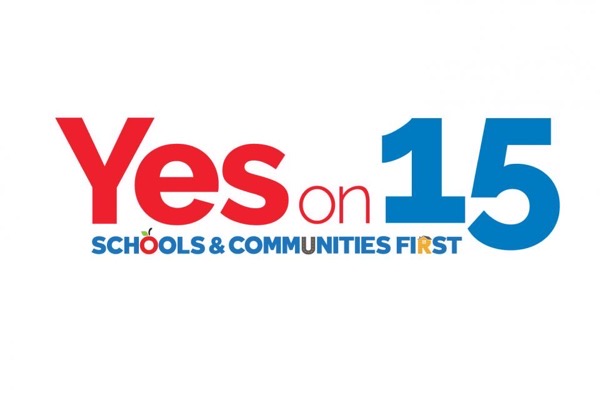 Prop 15: Property Tax for Schools: YES
Prop 15: Property Tax for Schools: YES
The Chronicle’s editorial endorsement of this begins with the headline “California Prop. 15 would cause businesses to pay fair share of property taxes” which pretty much says all you need to know. Prop 15 seeks to undo one of the many disastrous consequences of 1978’s Prop 13. That measure froze property taxes at 1% of the purchase value. So after purchasing property, no matter how much more valuable it became over time, the owner’s property taxes stayed the same. While arguments can be made for the protections this gives homeowners from being priced out of their homes, Prop 13 also applies to commercial property. There is no strong argument why business should not be charged property taxes commensurate with the value of their property.
Prop 15 rescinds Prop 13 for commercial property. If passed, commercial property worth more than $3 million would be reassessed at most every three years, starting in July 2022 “” or possibly later if the Legislature thinks we need more time to recover from COVID.
This may sound a bit wonky, but frankly, it is probably the most important thing on the ballot other than Joe Biden*. Why? The Benjamins. Prop. 15 will generate an additional $6.5 billion to $11.5 billion annually and these funds will go to schools and local governments. Much of the decline of the once vaunted California education system comes straight from Prop 13 madness.
PLEASE VOTE YES ON PROP 15.
(Also, SPUR’s write up is well worth your time.)
*And yeah Prop 16 is close.
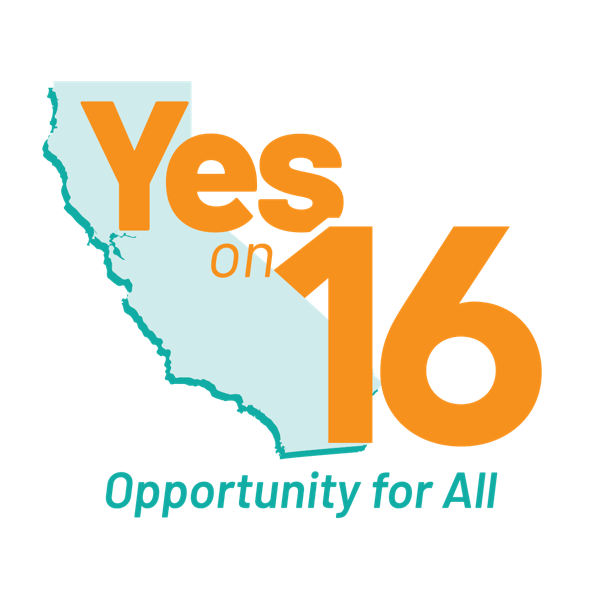
Prop 16: Allows Affirmative Action: YES
Back in 1996, Californians passed Prop 209, eliminating affirmative action programs in the state. In one fell swoop, the playing field was tilted back towards the “haves”, giving the “work even harder” end back to the “have nots”.
Prop 16 simply reverses that decision.
For me, this is a a no-brainer: systemic racism is real and persists like a M*****F*****. I do understand that some may feel like affirmative action is “reverse racism” , but that is a very narrow view of all the privilege around us that permeates the lives of the “haves.” I suggest you start with this quick read: John Scalzi’s EXCELLENT: “Straight White Male: The Lowest Difficulty Setting There Is” )
Anyway, for most of us, this is probably all that needs to be said. But if you want details, or to convince someone who is perhaps more centrist or to the right, try SPUR. Solid. reasonable.
We’ve made this mess over generations, and fixing it will take work in many places. This is a big one. Yes on Prop 16.
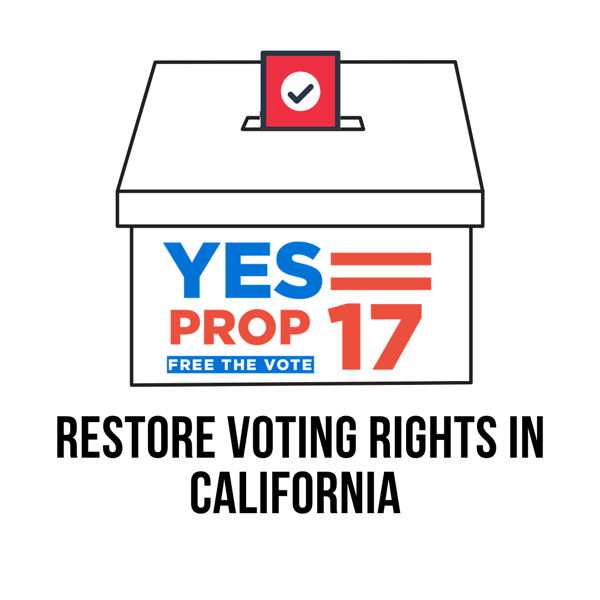
Prop 17: Right to Vote After Prison: YES
You can look at this one as a simple fairness issue: The California Constitution denies the right to vote to people serving a prison sentence and to people on parole. Proposition 17 would remove the restriction for people on parole. This would allow around 50,000 Californians who have served their time in prison to participate in our democracy. Fair.
But there is a deeper angle: Systemic racism. Surprise! California has used laws such as these to suppress non-white votes for a long, long, long time. Here’s a great quote from the Yes on 17 website, but you should really check out the time line on this page!:
Felony disenfranchisement in California is as old as our state itself. Fearing a rise in the political power of Black Americans, Native Americans, Latinos, and Chinese immigrants, California wrote felony disenfranchisement into the state’s first constitution in 1849. Bans on voting for people with past convictions was reinforced by the racially discriminatory Jim Crow laws passed in the 1800s. After the 15th Amendment of the U.S. Constitution banned voting restrictions based on race, many states used criminal convictions””coupled with the intense over-policing of communities of color””as a way to stifle the political power of Black and brown communities. After being the only former free state to initially reject the 14th Amendment extending citizenship to formerly enslaved persons, California also rejected the 15th Amendment in 1870, and did not ratify it until 1962.
Yes on 17!
Prop 18: 17 Year Olds Vote In Primaries: Yes
Proposition 18 allows 17-year-olds who will be 18 at the time of the next general election to vote in the primary elections that lead up to the next general election. Studies show that the earlier you get people to start voting, the more it becomes a habit. Done and done.
Prop 19: Prop Tax Rules: No
Remember 2018? I don’t, but someone told me you could go outside without a mask. 😳
Anyway, back in that fabled and probably made-up time, a version of this year’s Prop 19 appeared on the ballot as Prop 5. I wrote “Sneaky Lame Prop-Tax Wealth Redistribution of the Rich-Get-Richer Variety: NOOOOOOO.” Well, it’s back and it has gotten better… honestly, I’m on the fence with this one. On one hand it is still a lame generational wealth transfer, but they’ve tossed in closing an egregious inherited property loophole that will bring much needed reform and $$$ to the state (which is why so many people support it this time.)
Prop. 19 will let older property owners take their low tax assessments (thanks again Prop 13!) on to their next home anywhere in the state. CA Realtors love this, because it means more people buying houses, but it is bad policy because it is a generational wealth transfer: Old folks who already have homes get big property tax discounts whereas younger home buyers have to pay a lot more in property tax, making home buying harder for them. On the plus side, though, the realtors added a good one to sweeten the deal: this measure will end a loophole by which people who inherit a property could maintain their parents’ or grandparents’ generous low property taxes. So shutting off this inequity is a good thing, and to make it au courant, the tens of millions raised by plugging the loophole will be earmarked for firefighting efforts.
In the end, I’m going to vote NO because underneath it all is just cynical calculation by the California Realtor’s Association. That being said, if it passes, some good will come of it, because all those big $$$ steered towards firefighting are gonna come in handy 😱). (Which is why SPUR is for it, for example.)
I liked what the LA Times said:
Two years ago, the California Realtors Assn. put a costly, unfair and blatantly self-serving initiative on the ballot. Their measure would have offered older homeowners “” who already benefit from Proposition 13, the state’s property-tax relief initiative “” another huge and permanent tax break to spur more home sales. Wisely, voters rejected the initiative.
The Realtors went back to the drawing board. They retooled their original property tax change, combined it with a proposal to eliminate a generous tax break for inherited property, threw in a funding promise for firefighters and convinced the Legislature to put the package before voters.
The result is Proposition 19, a cynical and unwelcome melding of good and bad tax proposals. Voters should reject it.
Vote No.
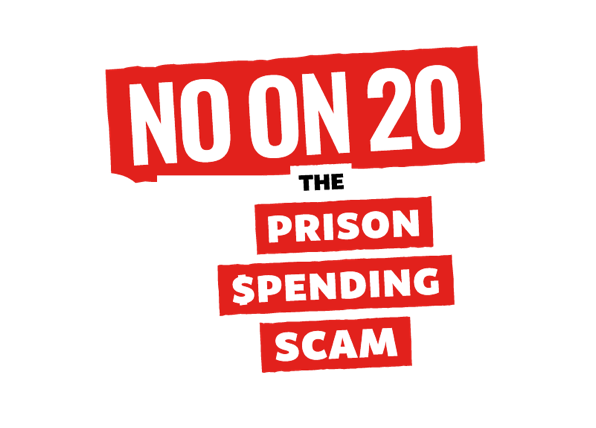
Prop 20: Parole Restrictions: NO
Hey Prop 20, President Evil Cheeto called and wanted his “Law and Order” hysterics back.
Basically, this was cooked up by Southern California Police Unions (are there *any* Police Unions that aren’t evil? Is it true that they all support Evil Cheeto?) to move more non-violent crimes from the misemeanor category to the more serious felony category and to make it harder to get parole by adding more hurdles to cross.
Why? Because LAW AND ORDER! Yep. That’s it.
I can’t even on this one. 😡
Proposition 20 would reverse years of criminal justice reform that has reduced California’s prison population while not increasing crime. Rolling back these reforms when California’s prisons are still overcrowded, people of color remain over-represented in those prisons and crime is at historic lows would be an unjust and indefensible policy decision. Additionally, this measure would put a significant and disproportionate economic burden onto people involved in the legal system and their communities.
HELL NO.
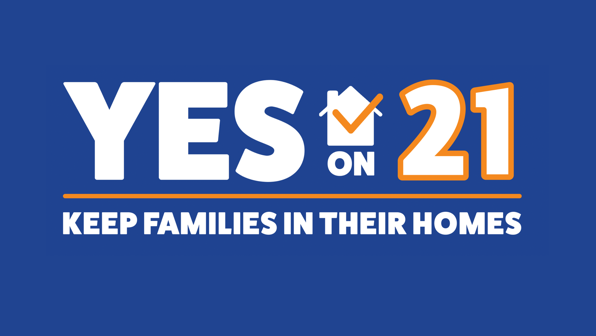
Prop 21: Local Jurisdiction for Rent Control: Yes
This one is really interesting, and worth a bit of a deeper dive. It’s about Rent Control, which I’ve always thought was a good thing, but is actually more complicated.
This measure modifies the 1995 Costa-Hawkins Rental Housing Act limiting how much rent-control local governments in California can impose. Before I explain how, it is important to explain Costa-Hawkins and the tricky nuances around it. Luckily, I did so two years ago, when I endorsed Prop 10, an effort to repeal it (which did not pass – it got clobbered!)
So let’s start with yours truly from the November 2018 Deep Slate:
Prop 10: Allow Local Control of Rent Control: Yes
Wow ““ this is a tougher one than I thought. For me, rent control feels like a no brainer. And while I’m still “yes,” I can see why thoughtful people would be “no.”
But first, what are we talking about?
Prop 10 will repeal the 1995 Costa-Hawkins Rental Housing Act, which limits how much rent-control local governments in California can impose. In San Francisco, for example, this has frozen our rent control to only apply to units that were built before 1980, amongst other things. If Prop 10 passes, San Francisco and other localities would be free to apply their own rent-control ordinances in whatever ways they see fit.
While we’d be free to make up whatever rent control we’d like, things get tricky:
Everyone agrees that rent control is not a real solution. The *real* solution is building a TON more housing… but that’s hard (for us 🤬) and takes time. Since we’re not building enough housing fast enough, the argument goes that we should have rent control.
But the SF Chronicle (and SPUR) both make pretty convincing cases against it. Here’s the Chronicle:
Much like trade barriers, rent control enjoys persistent political and popular appeal despite its nearly universal rejection by economists. Its benefits accrue to those renters who happen to occupy the controlled units, who become a devoted lobby for the policy, at the expense not only of property owners but also of other tenants. Most alarmingly for a state with a crushing housing deficit, rent control tends to reduce the quality and quantity of rental housing, the construction and maintenance of which is discouraged by price caps.
Wow. So why am I still yes?Not so fast: some economists disagree, and some of the analyses have raised significant questions. I particularly like this study from the Berkeley Haas Institute* that demonstrates that rent control can be used well and doesn’t have to have all the downsides opponents imagine. They also point out upsides I hadn’t considered, such as the notion that that public benefits, like neighborhood improvements, disproportionately benefit landlords by increasing rental values. It hurts tenants without rent control, so rent control is one way to level the playing field.
Similarly, the LA Times points out that there are various good local tweaks that could be used such as “rolling rent control” (apply rent control to buildings as soon as they reach, say, 20 years old) that would mitigate some of the problems with rent control dis-incentivizing new housing creation.
Ok… so how to vote?
The core problem is that we just aren’t building enough housing ““ we Californians seem to hate both density and sprawl…grr! We’re not fixing that issue soon enough and need to do *something* in the meantime. This is that something… with local control we’ll have options to tweak the implementation to avoid some of the downsides and provide real relief.
Again, the LA Times:
The root of California’s housing crisis is the lack of supply. The state needs to build 1.8 million more homes by 2025 just to keep pace with population growth; it would need 1.7 million new homes on top of that to satisfy pent-up demand and stabilize prices. To even get close to that number would require a building boom unlike any California has seen since the 1960s.
In the meantime, cities need to be able to respond to upheaval and suffering caused by rapidly rising rents.…
Local governments are on the front lines of managing homelessness, displacement and gentrification. They need the ability to stop the bleeding. Proposition 10 would give them an additional option for helping those at risk of losing their homes. Proposition 10 isn’t the solution to the state’s affordable housing crisis, but it is a valuable tool to manage the consequences.
So, yes.* (hat tip to The League of Pissed Off Voters for pointing this article out to me)
So what is different with Prop 21 over Prop 10? Whereas Prop 10 tried to repeal Costa-Hawkins (and thereby allow jurisdictions to do whatever they want with rent control), Prop 21 is much more surgical: it allows, but does not require, jurisdictions to amend Costa-Hawkins as follows:
1. It allows jurisdictions to create “rolling rent control” of 15 years. Buildings built 15 years before can come under rent control, rather than all buildings before 1980 as is set in San Francisco.
2. It allows (but does not require) jurisdictions to use “vacancy control” to reduce overall rents by limiting how much landlords can increase rent when tenants move out.
I liked 10 for the reasons I wrote above, and I like this more surgical approach as well.
The LA Times sums it up well again:
Ultimately, the solution to California’s housing crisis is to build more housing, especially affordable housing. That will take reforming zoning codes and regulations that make it impossible to build apartments and townhomes in many communities across the state. It will require reducing onerous fees and bureaucratic hurdles that layer on costs and push up the price of new homes. This is vital work to make California more affordable, but it will take years to construct enough homes to bring down prices. Until then, rent control can be a helpful tool to provide housing stability.
Yes on 21.
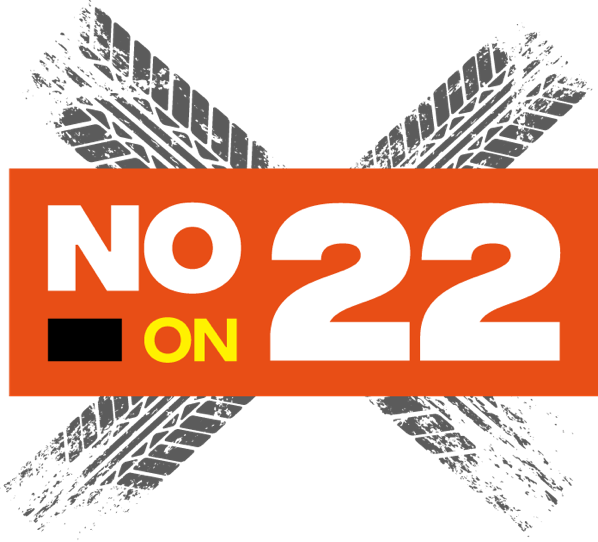
Prop 22: Benefits Exemption for Uber/Lyft etc: NO
The simple take on this is that Uber, Lyft, and Door Dash are literally spending nearly $200 million dollars to pass Prop 22. Why? To exempt app-based ride sharing companies from state labor laws designed to protect workers and require payments into things like unemployment benefits and Social Security. This is evil and must be stopped.
The reality is *slightly* more nuanced, but nonetheless the “simple take” is pretty close to the mark. There is no question that Uber and Lyft underpay their workers and don’t contribute to important social safety nets for all workers. But it is also true that many people have come to rely on working for gig companies, and many more people have come to rely on them for essential services. Uber and Lyft argue that they can’t operate if they treat their drivers like all other workers and that they will go out of business if forced to do so. This would effect a lot of people.
Something must be done…but unfortunately, this is a bad solution. Even if it was a good solution we shouldn’t be voting on it at the ballot.
First, Prop 22 is a bad solution because it:
- Egregiously exempts Uber, Lyft, DoorDash, etc. from having to pay into Social Security, unemployment insurance and Medicare
- Papers over some of the most egregious shortcomings in benefits for gig workers, but still falls far short of fair benefits
- Limits liability for riders and drivers to sue the companies.
But beyond that, we should reject Prop 22 so a solution can be arrived at legislatively, rather than at the ballot. Laws made by the legislature can be changed by the legislature, by a simple vote, if they aren’t working as intended or have unintended consequences. As a normal ballot measure, Prop 22 (if passed) would normally require another ballot measure to change it – which makes it more difficult to iron out any problems. Where Prop 22 is actually SLEAZY is the stipulation that it can’t be changed without a (near-miracle) 7/8 super majority of both chambers of the State Assembly. 🤬
The New York Times editorial board puts it all really well and simply, saying that Prop 22 “is designed primarily to protect the companies from properly paying for their legion of workers, and voters would be wise to reject it” , and they go on to say “The gig economy has become a part of our daily routines. But workers shouldn’t have to bear the brunt of a business model that works only when they are exploited.“
Exactly. NO NO NO on 22.
.ps The SF Chronicle endorsement is egregious. I can see why one might support this, but to paint Uber and Lyft as victims in Sacramento is obscene. Joe Eskenazi’s takedown in Mission Local is a powerhouse: The Chronicle’s endorsement of Prop. 22 was as loathsome as it was predictable.
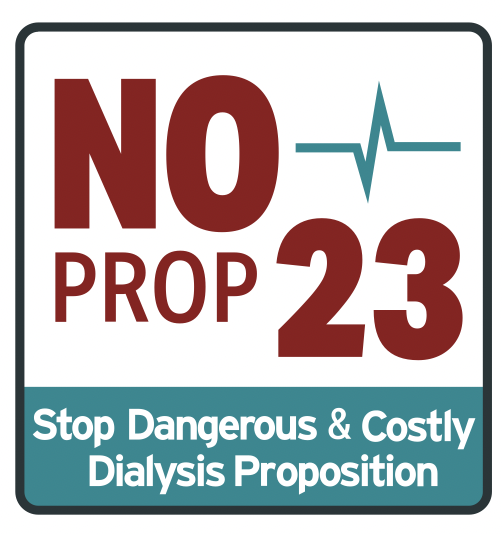
Prop 23: State Requirements for Kidney Dialysis Clinics: No
I’m not going to spend much time here. This is another rehash of an issue for 2018, this time with no particularly redeeming qualities added in. As I explained in detail back in 2018, labor disputes have no business being on the ballot:
Another upside of reading my 2018 post is that you can go watch John Oliver’s takedown of Kidney Dialysis companies – they really are horrible.
Prop 24: Consumer Digital Privacy Protections: No
I’m a big fan of consumer digital privacy protections and California is leading the charge on these laws domestically. We really need to have strong laws to protect users from the tracking and selling of personal data, and holding sensitive personal data (which makes it vulnerable to data theft). This measure aims to do all of that, and by all accounts much of what it does is quite good.
But the problem is, this is a complex, 52-page law that should be done legislatively “” not at the ballot. There are simply too many things it might get wrong to be a ballot measure. And if they are wrong they will be very difficult to fix.
Beyond that, there are plenty of reasons to believe this legislation, though well intentioned, misses the mark; both the Electronic Frontier Foundation and Consumer Reports have stayed neutral, with the EFF saying:
The right place for this important task is at the Legislature. They’ve made a good start with 2018’s California Consumer Privacy Act and we should let them further stregthen protections legislatively, so we can get it right.
No on 24.
(.ps I’ve deliberately not gone into the details of what Prop 24 does, but if you want to know, check out SPURs typically thorough wrote up.)
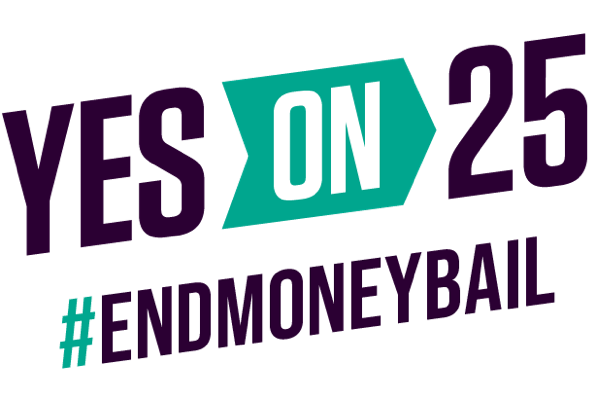
Prop 25: End Cash Bail: Yes
The one part of this that seems incontrovertible is that the cash bail system discriminates against the poor: Poorer people have to await their trial in jail solely because they cannot afford to post bail, while richer defendants can leave.
Worse still, this burden is disproportionately faced by Black and Latino defendants (say it with me again: systemic racism!) – as SPUR puts it:
The devastating impacts of this system are disproportionately experienced by people of color. In California, our criminal justice system detains and arrests Black and Latino Californians at disproportionate rates. Consequently, Black and Latino Californians are more likely to be faced with the burden of posting bail, paying a nonrefundable fee to a bail bond provider or awaiting their trial in jail. Nationally, Black and Latino defendants are also more likely to have bail set at higher amounts than white defendants
In 2018, the legislature passed a landmark bail reform measure, SB 10, and Gov. Jerry Brown signed it. SB 10 did away with cash bail in favor of “risk algorithms” : by taking in a variety of data points such as the defendant’s criminal history, job status and zip code, the defendant’s flight-risk would be assessed. If the defendant is not a flight risk they would be allowed to await trial without waiting in jail.
This sounds decent, except for the very real devil in those details: risk assessment algorithms have been demonstrated to produce racially biased results depending on the data points used or the selective use of these systems by judges. Are we replacing one bad system by an intrinsically worse one?
I believe not. First, the current system is clearly and demonstrably regressive (hurts poor people more) and racist. The new system *could* be racist but is unlikely to be as regressive. And since it will be established by the Legislature and can be tweaked by the legislature, a reasonable assessment system can be created.
Vote Yes to End Cash Bail.
.ps For two good and opposing deep dives on this I recommend SPURs (which I found most convincing) and The League of Pissed Off Voters’ – which had some fascinating history.
HOORAY – YOU MADE IT THROUGH THE STATE STUFF! Let’s relax for a minute with this fabulous Bollywood video!
(Psst! If you like that, you might like my completely ridiculous version 😠)
SAN FRANCISCO:
Board of Supervisors (D1): Connie Chan

Connie Chan impressed us at the SFLCV, with her breadth of experience and her commitment to affordable housing in D1 (a harder sell in the Western parts of the City) and her support of safe, walkable, and bikeable streets. I expect that her long political experience as an aide for former Supervisor Sophie Maxwell, then-District Attorney Kamala Harris, and Supervisor Aaron Peskin will enable her to hit the ground running.
Board of Supervisors (D3): Aaron Peskin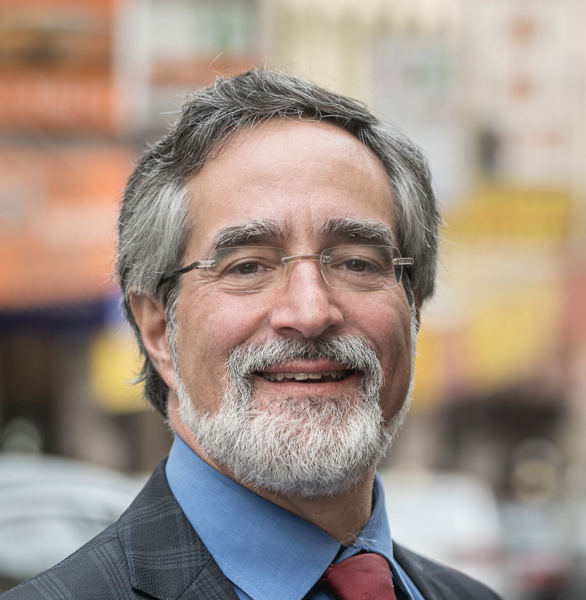
I’m a big fan of Aaron Peskin. He’s smart-as-hell, tenacious, and gets things done. While some may question his pugnacious approach to the rough and tumble world of City Hall, it is impossible to question his tenacity and his results.* And while he’s never been someone I agreed with 100%, he’s an environmental champion and a real leader on the Board.
As I was writing this, I was struck by how the progressive left Guardian and the centrist-right (for SF) Chronicle said similar things:
The SF Bay Guardian:
What can you say: Peskin has been one of the most effective supervisors in what is now 12 years on the board. We don’t always agree, and at times his votes and endorsements can drive us crazy … but in the end, he’s part of the progressive majority.
The SF Chronicle:
Aaron Peskin is the most seasoned and savvy member of the San Francisco Board of Supervisors. He served on the board from 2001 to 2009 “” as president the final four years “” then reclaimed his seat in 2015. Peskin’s depth of knowledge on myriad issues, most notably the budget and transit, will be an asset for a city encountering a rough period with the pandemic and economic shock.
…
We’ve had our differences with Peskin over the years, but always respect the level of his homework, tenacity and accessibility. He should be re-elected.
If you want more specifics, read what I wrote about him over at SFLCV.org. He’s the real deal. Done.
*I liked this summation I wrote at SFLCV so much, I plagiarized myself.
Board of Supervisors (D5): Vallie Brown
This is a tough one and I keep changing my mind. There are good reasons to vote *for* the two main candidates Dean Preston and Vallie Brown… and good reasons to vote *against* both of them.
In the end, I feel the same way I did in 2019 (when Preston beat Brown) so I’ll post what I wrote then:
This is the other big race of this election, pitting incumbent Supervisor Vallie Brown (who was appointed by London Breed to fill the seat she vacated when she became mayor) and Dean Preston, the tenant’s rights activist who ran against Breed in her last election.
Dean Preston is the darling of the City’s progressive block and a Democratic Socialist a la Bernie Sanders. He’s spent many, many, years working on tenants right’s issues and would be an interesting and dynamic progressive Supervisor.
Vallie Brown is a long time Supervisor’s aide in D5, first under Ross Mirkarimi. She’s worked diligently on numerous issues near and dear to my heart, such as the plastic bag ban and CleanPowerSF. She’s very experienced at City Hall and capable of getting good things done.
There’s knocks against both of them: Preston is inexperienced as a legislator and some of his positions on important issues come across as half-baked. Brown was involved in a nasty eviction from property she owned and the evidence strongly suggests she was pretty heartless about it.
There are good reasons to vote for both of them. But for me, Brown’s environmental record is the difference. Here’s what we said with our endorsement at the SF League of Conservation Voters:
She has a consistent track record on local issues and has shown a willingness to listen, and we find that she makes smart, thoughtful decisions. Since her appointment last year, Brown worked on several environmental issues, including expansion of the plastic bag ban, energy use reporting for large residential buildings, and renewable energy mandates for large commercial buildings. Most recently, she introduced legislation to end natural gas use in municipal buildings.
(.ps It’s a ranked choice vote and there are several candidates, but really this race is just between these two so I didn’t bother to rank.)
Board of Supervisors (D7): 1. Myrna Melgar 2. Vilaska Nguyen
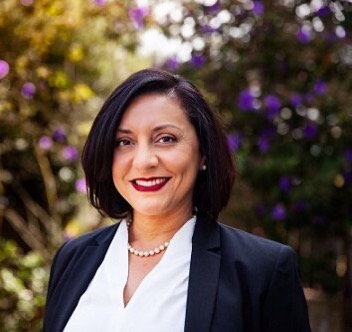
In our interviews with District 7 candidates at the SFLCV, I was most impressed with Myrna Melgar and Vilaska Nguyen.
Here is what we wrote about Melgar at SFLCV. If you live in D7, I highly recommend giving her your #1 vote. And though we did not choose to endorse Vilaska Nguyen, I was also impressed with him, so I’ll put him as the #2 for D7.
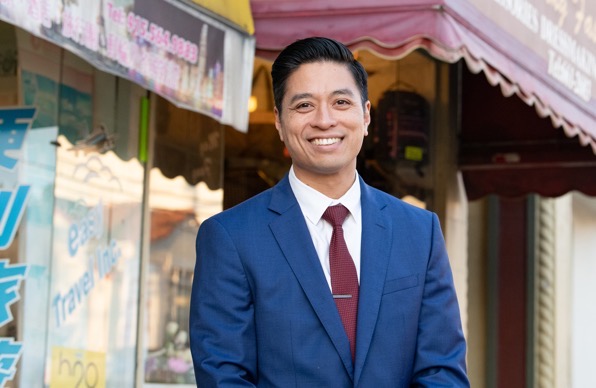
Board of Supervisors (D9): Hillary Ronen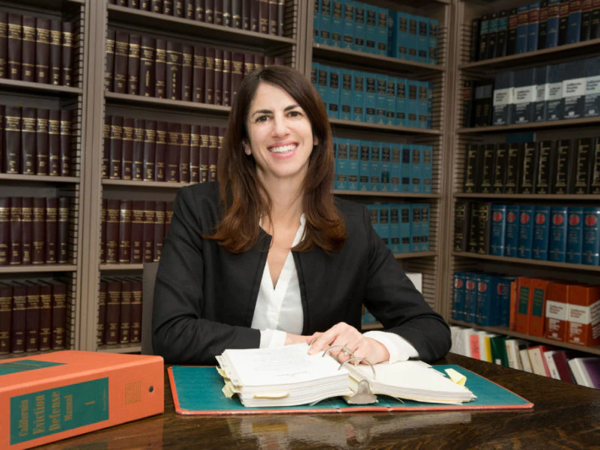
Hillary Ronen has been a compassionate and strong leader on the Board of Supervisor and I’m happy to have her as my Supervisor. She’s involved in the issues that our District really struggles with: affordable housing, displacement, and the ongoing mental health problems on our streets*. Her support of bike lanes and red lanes for MUNI in our district have also been appreciated. Done and Done. Go Hillary!
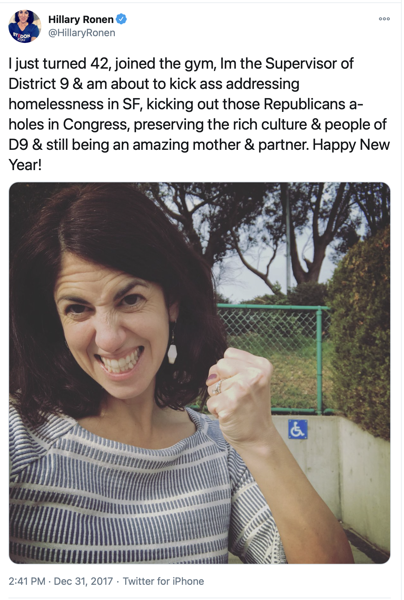
*I’m particularly looking forward to the implementation of her and Supervisor Haney’s Mental Health SF bill, which should get mental health staff on the front lines of dealing with people suffering from mental health issues on our streets instead of police officers.
Board of Supervisors (D11): John Avalos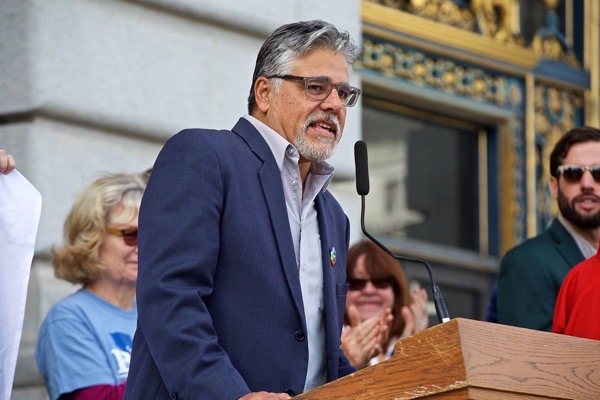
John Avalos is back, running for Supervisor after two really productive terms, and four years off the Board (as required by law). He’s been a leader on lots of progressive issues I care about (he led on Clean Power SF, and did a lot of great bike and pedestrian safety work) and a real voice for working class San Francisco – which is very much in tune with his District. He’ll make a much better Supervisor than his incumbent opponent Ahsha SafaÃ
To be honest, sometimes he brings more heat than light, and I wonder if his combativeness has cost him the endorsement of other “progressives” such as Jane Kim and Aaron Peskin. The SF Bike Coalition’s endorsement of him sums up my feelings pretty well:
John Avalos has been a champion for cycling in this City. He has been endorsed repeatedly by the SF Bicycle Coalition in the past. Ahsha Safaà has consistently failed to meet the necessary standard for our endorsement and as Supervisor has blocked SF Bicycle Coalition priority projects in District 11. Thus, while we repudiate John Avalos’s offensive exchanges with other politicians, we endorse this long-time advocate for bicycling within our City with the understanding that he has begun to and can continue to mend fences with his political colleagues.
Board of Education: Matt Alexander, Kevine Boggess, Jenny Lam, Michelle Parker
These are the four candidates who impressed us the most at the SFLCV and additionally have lots of good endorsements from several sources I value.
Community College Board: Aliya Chisti, Victor Olivieri, Tom Temprano, Alan Wong
Similarly, these are the four candidates for Community College Board who impressed us the most at the SFLCV and additionally have lots of good endorsements from several sources I value.
Board of Directors (District 7): Lateefah Simon
Board of Directors (District 9): Bevan Dufty
Both incumbents have done a really strong job at the BART Board. Lateefah Simon has really pushed BART on social justice and police reform, which it needs. And she’s just kickass (social justice warrior, Mom, legally blind, doesn’t own a car.) (This SF Chronicle article is a good wrap of the race.) Bevan Dufty has been a welcome surprise. As Supervisor for District 8, I was never a fan, but he’s reinvented himself and has been a real champion for making BART work and has been great on transportation issues in general.
Prop A: Health and Recovery Bond: YES
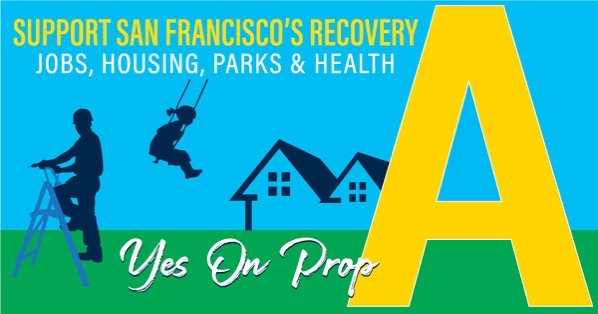
This one is pretty much a no-brainer (though if you want details, I wrote “˜em up good at SFLCV.org).
Prop A is an almost $500 million bond to fund:
- Facilities for treatment and supportive housing for the homeless/mentally ill
- Parks and recreational facilities
- (and a smaller amount) for street and pedestrian improvements
As much as those are good and necessary things, the timing is important (from my write up):
Perhaps just as critically, the timing of this measure is important. This type of government infrastructure spending is an important tool in dealing with recessions and helping many San Franciscans cope with the financial fallout of great upheaval such as this pandemic. By funding “shovel-ready” projects across the City, this bond will inject much needed infusions of cash into the local economy and bring important services and quality of life enhancements to all San Franciscans.
Yes on A!
Prop B: Department of Sanitation and Streets: No
I’m generally a fan of Supervisor Matt Haney – he’s smart, talented, dedicated, and a friend. But I’m not fan of his Proposition B.
I agree with his goals – we seriously need cleaner streets demmit! And we need better oversight of the Dept. of Public Works, which obviously sucks at not being corrupt.
But adding a whole new department to our city’s already rather large government when maybe simply an oversight body would do the trick is bad policy and a poor way to spend money, which will be in increasingly short supply in the post-COVID recovery. NO NO NO.
If you want more details, our write up at SFLCV.org is quite good, and we conclude thus:
The City is facing a slew of new challenges and budget constraints. Voters have little patience with the City’s inability to address sanitation conditions downtown and elsewhere. Rather than create bureaucratic duplication and unaccountable commissions, we urge the Supervisors to hold Public Works accountable and develop a strategy to deal with a situation that has escalated over many decades. We wholeheartedly agree that DPW needs oversight and we could have supported a straightforward measure to address that issue.
Sorry Matt. NO.
Prop C: Non-Citizen Voting for Boards and Commissions: YES
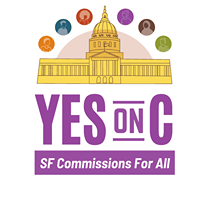
This measure would open City commissions, committees, and boards to all residents of San Francisco that are of “legal voting age” regardless of citizenship. (that’s pretty much it, but there are more details at SFLCV.)
Diversity. Inclusivity. Democracy. YES.
Prop D: Sheriff’s Dept Oversight: YES
Hey! Remember that time that members of the Sheriff’s office set up a gladiator style fight club so prisoners could battle each other for food and to avoid punishment? And remember how they got caught, but then they got off because someone at the Sheriff’s office took a hammer to the hard drive with crucial evidence on it to “destroy a virus.”
This measure amends the City Charter to set up independent Sheriff’s oversight like the SFPD have, because who watches the watchmen (Quis custodiet ipsos custodes)? Yes.
Prop E: Abolish Minimum Police Staffing Requirement: YES
Currently, the City Charter requires the Police Department to maintain 1,971 full-duty officers on the police force at all times. Why that number? For… um… reasons. (Or as SPUR puts it, “The rationale behind this number is not evident” in their excellent and thorough write up.)
This common-sense measure scraps that number and will allow the City to make rational staffing decisions. This will align nicely with things like the Haney/Ronen Mental Health SF bill mentioned above (in the District 9 endorsement) and with our national conversation on defunding the police.
Prop F: Business Tax Overhaul: YES
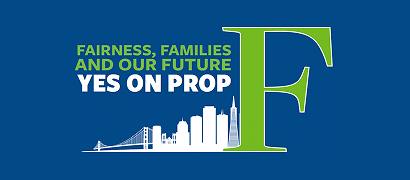
Prop F does 2 things:
- It changes the way SF taxes business, replacing the payroll expense tax with a more progressive gross receipts tax (poorer folks pay less, richer more) – that also encourages employment rather than penalize it.
- Frees up nearly $1 BILLION dollars we’ve collected since 2018 for homelessness (11/18’s Prop C) and universal child care (3/18’s Prop C) that has been tied up in litigation. 😡
Both of these are very good things and we should do them. (for more details, our write up at SFLCV is a good one.)
YES.
Prop G: Youth Voting for Local Elections: YES
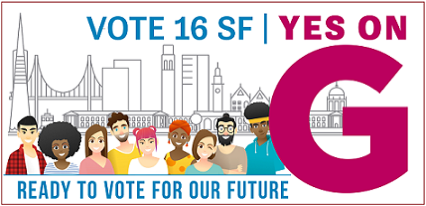
Vote 16 SF would amend the City Charter to allow 16-year-olds the right to vote.
As mentioned above (for CA Prop 18), studies show that the earlier you get people to start voting, the more it becomes a habit.
Some say their minds aren’t developed enough for the decision making required of voting. To that I point out the roughly 30% of Americans who support the Evil Cheeto.
There is also a more sobering reality we need to discuss here, and it is made well in the (really good) SFLCV post on this subject with this quote from the Washington Post:
A solid majority of American teenagers are convinced that humans are changing Earth’s climate and believe that it will cause harm to them personally and to other members of their generation, according to the Washington Post-Kaiser Family Foundation poll (Summer 2019). Roughly 1 in 4 have participated in a walkout, attended a rally or written to a public official to express their views on global warming “” a remarkable level of activism for a group that has not yet reached voting age.
It is their future we are fucking up and they deserve a say. YES.
Prop H: Planning Code Reforms for Neighborhood Commercial: nyes? yno? yes
Wowowowowowow. I *really* can’t decide on this one.
This measure is a 100-page package of amendments to the planning code. It takes a hatchet to our ridiculously difficult process for opening a small business. It’s also a grab bag of planning code changes to reduce planning code restrictions various things that could very likely help small business. Things such as allowing more allowed uses of various types of spaces without a permit or allowing table service in parklets, even though they are public space open to everyone, not just restaurant patrons, etc., etc.
On principle, Planning Code should not be decided at the ballot! If it’s wrong, it’s too hard to change – it would require another ballot measure! This should be done legislatively at the Board of Supes, were it can be deliberated upon carefully and easily changed by a majority vote if need be. Mayor Breed put this on the ballot and is very cognizant that she could take this to the Board of Supervisors. This is a naked power play by the Mayor to endrun these provisions past the Board of Supes to get things her way quickly and easily, rather than going through a normal legislative process with normal public comment and review. No.
On a pragmatic level, the measure does a lot of probably good things that can probably really help our small businesses NOW. Many of these business are facing an existential crises from COVID NOW. Weeks and months matter. So “Yes.”
I was all set to say “No” here because planning code changes made at the ballot are so hard to change, but Breed inserted a clause that allows the Board to amend the measure as needed, reducing the downsides. So I think I’m going to reluctantly say yes. Ugh. Ballot measures suck.
Yes on H.
.ps I found The League of Pissed Off Voter’s “NO” argument very compelling. I also found SPUR’s YES argument very compelling.¸
UPDATE: I just spoke with my friend Tom Radulovich, Executive Director of Livable City. They are supporting H and pointed out that that this is “it’s perhaps the best way to do something the wrong way” in this generally awesome chat
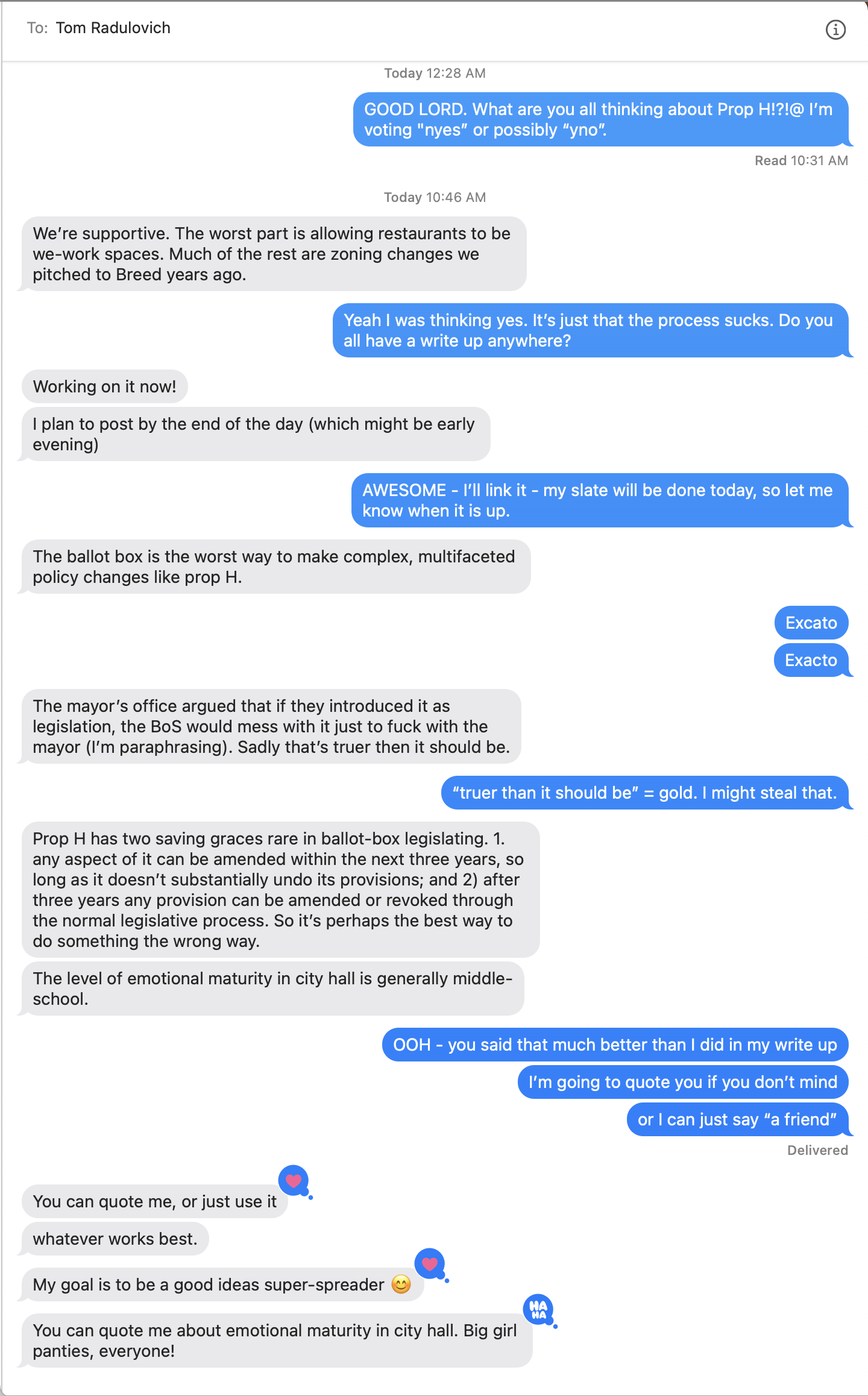
So make me “Yes“.
.ps I told Tom I was going to use our whole chat:

Prop I: Increase Transfer Tax: Yes
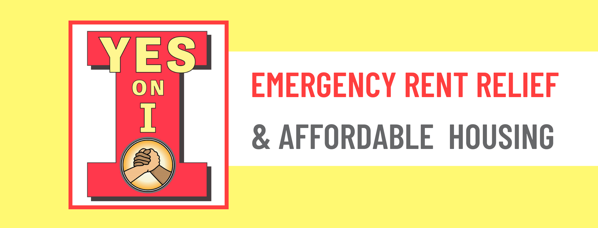
I’m generally inclined to support taxes on the wealthy since so much is stack in their (our) favor. And Prop I has a long list of endorsers I generally trust* like the Sierra Club, the SF Bike Colition, former State Senator Mark Leno, etc etc.
So Yes!
.ps The only notable outlier is SPUR who is against it for somewhat compelling reasons. I’m still in the “Yes” column, because I imagine this is their pro-business bias coming to the fore.
Prop J: Parcel Tax Update: Yes
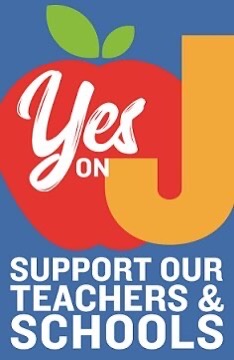
Another easy one (whew – so tired of writing!) and another stop-legal-wrangling over something we passed! In June 2018, SF “passed” Prop G, to pay SF teachers more by adding a $320 property tax to each property in SF. By the City’s interpretation of state law it could go into effect since it passed by 61%. The City started collecting the property taxes, but anti-tax folk sued saying that state law actually required 66% of the vote to pass this tax. Now that money is just collecting dust, while the legal process grinds on, trying to decide whether this measure needed 61% or 66%.
Meanwhile the teachers and schools that need the money get nothing. 😖
So Mayor Breed put this measure on the ballot, reducing the tax to get more votes, focusing the money on the teachers and schools, and repealing the previous tax, in hopes of getting 66% and making the legal wrangling moot.
Vote YES.
(.ps I do have questions though – what happens to the extra money collected since the previous tax was higher? Why did this one need to repeal the prior one? Could we have structured this such that if we won in court, this one is superceded in favor of the 2018 version? But whatevs. Get this done!)
Prop K: Authorize Affordable Housing: YES
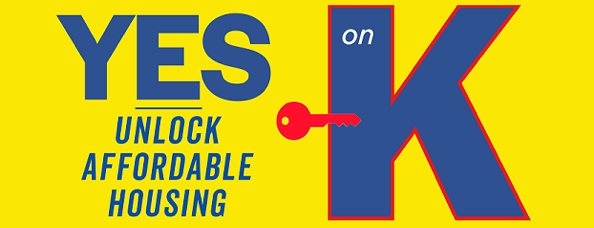
Ok kids, what are the magic two words that keep coming up this “˜Deep Slate (no, not “Evil Cheeto” though that’s a fair guess). Well, why do we even have to vote on Prop K which simply “authorizes San Francisco to build or acquire 10,000 units of municipal social housing.” Hint: S _ _ _ _ _ _ c R _ _ _ _ m.
Here’s a bigger hint:
We have to vote on Prop K because, Article 34 of the California Constitution, passed in 1950, was literally designed to make it harder for cities to build low-income housing by requiring voter approval first. It’s nothing more than a tool to keep poor and people of color out of richer, whiter communities, and it should be repealed statewide.
So, if you guessed the two words are “Systemic Racism” – you’re right! 😖
Anyway, Prop K will authorize a “Social Housing” pilot for 10,000 units in SF. SPUR says “Social housing” is a term more commonly used in European countries such as Denmark, Austria and Germany to describe both housing that is financed, owned and managed by the government and housing that is financed by the government but owned and managed by nonprofit entities or by cooperatives of tenants themselves.
Let’s get this done. YES.
.ps Unfortunately the latest effort to repeal Prop 34, SCA-1, led by Senators Ben Allen and our own Scott Weiner (see above) was not voted on in time and has stalled. 😡 Hopefully Scott will try again.
Prop L: Disproportionate CEO Pay Tax: Yes
Prop. L aims to start a national discussion of addressing income inequality. It would increase city taxes on any company that pays its CEO more than 100 times what its lowest-paid worker makes. The controller estimates that it will bring in anywhere from $60 million to $140 million. I’m a tad skeptical it will work (there are plenty of shell games that can be played) but it’s heart is in the right place, and maybe it will help turn the tide.
SPUR’s write up has great details. They are neutral.
Prop RR: Rescue Caltrain: YES
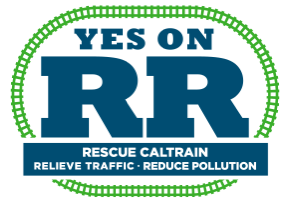
Caltrain is a critical link in our regional transportation (and the key to long-term hopes for a fast, easy, and low-carbon way of getting around the Bay Area). Prop RR is a tiny regional sales tax to provide critical stable funding. Here’s a snippet from SFLCV’s write up:
Measure RR authorizes a modest 30-year sales tax of 0.125% (1/8 cent) to fund operating and capital expenses of the San-Francisco-to-Gilroy Caltrain commuter service. This is important even for San Franciscans who don’t use Caltrain, because local transit agencies such as Muni currently contribute funding to Caltrain. A dedicated funding source will free up local transit agencies who need to focus on their own recovery and financial sustainability.
My only hesitation is that the tax is all on San Franciscans, whether they use Caltrain or not. But it is also true is that this will free up funding from MUNI, which is good for all San Franciscans – whether they ride MUNI or not.
If RR doesn’t pass by 2/3 in each of the three counties, San Francisco, San Mateo, and Santa Clara, it is hard to see how Caltrain survives. 😳
YES YES YES!
MY VALUES:
I recommend reading all of this (it won’t take that long!) to understand how I think. That way you’ll have a sense of how to asses my recommendations for yourself.
- I’m basically an idealist, an optimist, and a humanist.
- My opinions come from my experience in local politics over the past 25 years. I’ve done a ton of candidate interviews & lots of lobbying in my roles:
- as a Board member (and former long-time President of) of the San Francisco League of Conservation Voters (SFLCV)
- as a former long-time Board member of the SF Bicycle Coalition (SFBC)
- I don’t get a dime for this. I’m a software engineer by day and a political activist in my spare time.
- The three biggest “norths” of my political compass are environmentalism, social justice and good government (reform type) issues.
- While my views are definitely shaped by my activities in the SFLCV and previously the SFBC, my endorsements do NOT represent the views of either of those organizations.
- I use the term “progressive” a lot, as something I value. In SF, that has historically meant a combination of classical liberal Democratic politics (equity – social, gender, racial, diversity, a sense that government can and should play an important role in solving society’s problems) plus environmental values (sustainability, long-term systematic thinking) and neighborhood-level populism (tenant’s rights, ethnic and socio-economic diversity, populism vs. corporatism).
- I try to be aware of my biases; here are few that come to mind:
- Poorer before richer when considering fairness issues. It’s best if something is fair, but if someone has to get screwed, make it the rich person. Because society always favors the richer.
- The more money a local campaign has, the more questions should be asked of it: if a campaign has a lot of expensive media ads, mailers, etc… why? It might be fine, but the more money, the more questions as to why.
- In some of these races it is a matter of picking between flawed options. 🙁
- Ballot measures are a REALLY bad way to govern:
- Most things done in ballot measures SHOULD be done in the normal legislature, where they are easier to fix if they turn out wrong: you have to use a another ballot initiative to change or fix something that became law by a ballot measure, whereas the legislature can amend or fix any of their laws whenever they want.
- Another problem is that you have to boil complex issues down to yes/no votes – which rarely is a good idea. But this is what we have, so keep in mind that some good ideas make bad ballot propositions, and a bad idea can sound good in a ballot initiative because the devil is often in the details. Also note that these measures are often grey – there is a lot of balancing going on.
- 90% of my experience and knowledge is about local San Francisco issues, so state issues are a little greyer for me unless I say otherwise. Thus, for state stuff, I try to do a lot of reading and research from the sources listed below and anything else I can find.
- Just like you, some of my opinions come from listening to those I trust, or tend to trust. Organizations like the ones listed as “bedrock” below get more credence, as well as politicians I support and believe in. Obviously this is dicey, nothing beats firsthand knowledge and analysis, but that just gets us back to why I think ballot measures suck.
Sources:
My best sources are personal experiences, and interviews and lobbying I’ve done with the SFLCV and the SFBC. But the limits of this are pretty obvious. I have very little direct experience with state issues, so below are some of the sources I use and a bit on how I arrive at my endorsements.
The first source for SF stuff is the official SF Voter guide and for California stuff, the State Voter guide. I like to read the pro and con arguments and also note who is writing them, as that often tells you at least as much as what they say. Also the analysis and explanations are critical. Dig in!
For good baseline info on all of it, I highly recommend Ballotopedia: A wiki for ballots and elections! This is an incredible resource! I donated and maybe you should too! Here are there SF and CA pages – but you can fine other pages easily too:
Some of my bedrock sources are:
- My own San Francisco League of Conservation Voters (of course) (SF)
- The San Francisco Bicycle Coalition (SF)
- Livable City (SF)
- The Cailfornia League of Conservation Voters (state)
- The Sierra Club (state and SF)
- SPUR (a.k.a. San Francisco Bay Area Planning and Urban Research)
The groups above, with the possible exception of SPUR, generally share my values directly, and as such influence me a lot. SPUR is somewhat of an outlier, in that they are perhaps more centrist, but they are good-governmenty and I trust their motives. I particularly enjoy their commitment to sound policy, their clarity of thought, and their thorough write ups – I’d love to have the time and energy to do a slate as well as they do!
For state issues in particular, I really like to look at the various larger city newspapers. I know the most about the SF Chronicle‘s bias – I don’t trust them much on local stuff (they tend to be more conservative than me), but on state stuff I like to hear them out. It is also worth checking the other state papers like the San Jose Mercury News, the LA Times and the Sacramento Bee. Sadly, most of these are behind a paywall, but often you can read a certain number for free. (They should all make their endorsement editorials free as a public service.) Ballotpedia often has good links to the various newspapers as well.
In the “Friends with A Touch Of Rabidity” category are two more organizations I like to check in with. Both are super “progressive”, but sometimes bring more heat than light, getting mean-spirited and absolutist. Nonetheless, I tend to share a lot of their values and appreciate what they bring to the table.
- The San Francisco Bay Guardian (Sadly, the quality of this source has really declined since they were basically dissolved and the name got sold off to one of the editors.)
- The League of Pissed Off Voters (I’ve never liked their name – who can sustain anger for so long!?! But they do their homework.)
Finally, several of my friends do slates I really appreciate and there are a few others I check as well, when I find them:
- Ballot.fyi I first found this in 2016, and it is excellent! I hope they keep doing it.
- Kate Slate: My friend Kate McCarthy does a good job each election.
- Alix Rosenthal’s slate: My friend Alix Rosenthal’s slate is always really, really well done.
Extras:
Where To Vote:
SF has set up a awesome one stop website for all your “how to vote” type questions: SF Voter Portal
It should have anything you need to know:
- Where do I vote?
- Am I registered
- Has my ballot been counted
- etc etc
Oakland and San Jose:
So, I don’t pretend to know the ins and outs of Oakland or San Jose politics (If you have sites you like, please put ’em in the comments!) but the always thoughtful and thorough SPUR folks do SF, Oakland, and San Jose. See my thoughts on SPUR’s biases above.
Older ‘Deep Slates:
I believe I’ve been doing the ‘Deep Slate since sometime in the ’90s. You can read all the ones I’ve saved by clicking here – it gets a bit dicey because before 2012, they were email only (not blog posts), so I’ve posted the email versions I could find.

Greetings, I am forward this email regarding your choices for BOT CCSF. I think you are 100% wrong and hoe you will read below. I want to add that I urge you to vote for Anita and Aliya. They both have the students’ best interests in mind and heart. (I am a member of HEAT).
Two City College of San Francisco organizations, The Higher Education Action Team (HEAT) made up of faculty and concerned community members, and the student organization, the CCSF Collective, have collaborated to put out a report card on CCSF’s Board of Trustees. Please share it with people you know who live in San Francisco and who are voters.
The two-page report card should be part of this email. To make it bigger, click on it and enlarge it. It is also attached.
We requested responses to the report card from all trustee candidates. Six responded. Their responses are below under the report card.
FYI: Four candidates did not respond to the report card. They are the two of four incumbents running for re-election, Shanell Williams and Tom Temprano, and San Francisco supervisor aides, Alan Wong and Han Zou.
These four candidates also did not participate in a candidates’ forum organized by students. Williams responded to the forum invitation and declined to participate because she had a Democratic Party meeting scheduled at the same time. The other three did not even bother responding to the invitation.
Both incumbents, Williams and Temprano, were not endorsed by CCSF’s faculty union, AFT 2121.
The incumbents have a terrible record as board members and will hopefully be defeated. Most importantly, they have gone along with the massive number of class cuts. They voted to hire Rocha as chancellor over the objections, based on his record, of many faculty and community members. They voted to close CCSF’s Fort Mason campus to save money. That action may end up increasing the college’s budget deficit due to the loss of state funding for it. They did not publicly advocate for funding from the city to restore some 300 classes suddenly cut from the Spring 2020 last November by then CCSF Chancellor Rocha. Rocha emailed San Francisco’s mayor and supervisors discouraging this funding. The funding received a favorable vote from 7 of 11 supervisors. However, the mayor vetoed the measure. One supervisor opposing the funding was former CCSF Trustee Mandelman for whom incumbent Temprano works as his chief of staff.
Four candidates will be elected. If you are a San Francisco resident, I hope you vote for Anita Martinez who strikes me as the strongest and most knowledgeable of all of the candidates.
Again, please take the time to share the report card with people you know and encourage them to do the same thing.
Thanks.
Rick Baum
image1a.png
image2a.png
As a college professor and former senior university administrator, I wholeheartedly agree with your report card grades and support your endeavor to elect better leadership for the Community College Board. The current Trustees have failed our community with year-after-year of poor fiscal management, the politization of an education board, and the privatization of our college. Their egregious choices have now bankrupted City College, placed our accreditation at-risk (again), and caused for the unnecessary suffering of thousands of students, and that was all prior to the COVID-19 pandemic. Count on me to make the right decisions and never repeat their mistakes.
-Victor Olivieri
________________________
Protecting educational opportunity and student access during the pandemic, putting students first, and responding to the community are critical components in ensuring that City College of San Francisco is thriving. Unfortunately, the Board of Trustees has failed to successfully execute and address these critical components for our college community. Although the Board of Trustees has brought in some resources to the college, such as securing Free City and the facilities bond, new leadership on the Board is needed to ensure greater transparency and accountability, along with an unwavering commitment to finding community-oriented solutions.
-Aliya Chisti
________________________
Your report card rating the performance of the CCSF Board of Trustees identifies specific issues under each category that I have addressed in a variety of public formats including endorsement interviews, community meetings, Board meetings, and press conferences. These issues resonate with San Franciscans who raise them if I have not had the opportunity to raise them myself.
I am running because I hope to be a member of a Board of Trustees that will address the issues. Perhaps working together we can raise our grade point average to at least satisfactory while we aim for an A.
-Anita Martinez
_________________________
I agree that on all important metrics current City College Trustees earn an “F.†But this is not surprising. The outcome (a failing institution) is perfectly correlated to the input (a Board of politicians lacking relevant experience). I will bring A+ expertise, independence and 22+ years of Board experience to CCSF, ensuring it survives and thrives. I will work tirelessly to ensure that the CCSF Board hires a permanent chancellor, balances the budget (not just with fiscal discipline, but with creative revenue-generating opportunities), opens the lines of communication with students and faculty, and commits to operating with transparency.
-Marie Hurabiell
________________________
The report card shows the many ways in which the Board has neglected the people that elected them. I am running because the last-minute cuts harmed thousands of teachers and students — my classmates — and yet the Board made these changes with no warning, limited ability of the public to comment, and zero accountability. We all know there will be hard decisions ahead: the budget is in bad shape, and enrollment and funding are falling. But I will pledge, as Trustee, to listen to stakeholders, be transparent about the Board’s plans, and be a responsible steward of City College.
-Jeanette Quick ð£½å©•å®‰
___________________________
Reading the Trustees Report Card was distressing. As a Candidate for CCSF Board and an ally to the CCSF Collective and HEAT, I take this evaluation seriously.
The Board has failed to put students first. Trustees must value students and faculty. The current Board’s inability to represent students who depend on CCSF and ensure their success risks the institution’s accreditation.
The challenges of solving CCSF’s systemic issues are daunting but not impossible. Action is required. Returning City College to the high academic standards needed to serve its students, faculty, and communities should be the priority of any CCSF Board Candidate.
-Geramye Teeter
Pingback: » The ‘Deep Slate: My November 2022 Voting Guide